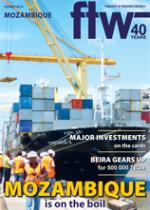FTW’s annual visit
to Mozambique is
always interesting and
encouraging.
Here is a country which was
paralysed by a bloody civil
war from 1977 to 1992. It is
estimated that a million people
died in the war, and millions
more were displaced.
Now, less than a generation
later, the country is enjoying one
of the highest growth rates in the
world. It will be fuelled (literally)
by huge coal, gas and oil deposits.
Mozambique’s agricultural
sector is also being revitalised.
For the freight industry this is
all good news.
It is pioneering work in
many cases as much of the
infrastructure has not been
modernised since the war, or is
regularly washed away by the
annual f loods and storms.
Road accidents are also a daily
occurrence.
According to the latest WHO
data published in April 2011
Road Traffic Accidents Deaths
in Mozambique reached 6,670 or
2.16% of total deaths.
The age adjusted death rate of
38.24 per 100,000 of population
puts Mozambique at number 10
in the world rankings of the most
dangerous place to drive.
This has implications for
trucking and courier companies
as it has wide-ranging
implications, not the least of
which is high insurance costs.
To that must be added the loss
of equipment. Trucks and trailers
take time to replace, and that
represents lost revenue.
But, there are even greater
dangers facing the long distance
drivers than the roads.
HIV/Aids and malaria are the
two leading causes of death.
The country has the sixthhighest
percentage of malariarelated
fatalities, according to
the World Health Organisation.
For the logistics industry this
means that staff at all levels have
to be made aware of the dangers
and given prophylactics and
preventative measures such as
mosquito nets over their beds.
Drivers are particularly at risk
to both malaria and HIV due to
the nature of their work.
There are many other factors
adding to the cost of doing
business in Mozambique.
Clearing agents have to deal
with mounds of red tape –
perhaps the most enduring legacy
from the Portuguese rule which
started in the early 16th century.
The introduction of an
electronic system known as the
Single Customs Window has
helped, but there are still delays
at the borders.
A hidden cost, which almost
everyone refers to in hushed
tones, is corruption – one of the
factors slowing down the flow of
trade.
Mozambique’s Central Office
for the Fight against Corruption
(GCCC) has warned that the
number of state employees
accused of
acts of
corruption
is on the
rise.
Speaking
at the opening
session of the
GCCC in
August
2013, the
organisation’s
Ana Maria Gemo,
said that 599 cases
against members of
the public administration were
processed by her office between
January and June of this year.
This compares with a figure of
509 cases in the same period of
2012 - a rise of almost 18%.
Then there are the costs
of staff, as well as office and
residential accommodation. All
are in short supply and therefore
expensive.
All that aside, every year we
find new logistics companies
have set up shop, while others
are expanding.
It is the region’s land of
opportunity. The business
community is much more
positive than those in South
Africa, and they are hard at
work planning how to manage
expansion instead of merely
surviving.
And, of course, the prawns
are still good – although we
prefer the cold crab served as
a starter in Beira.
INSERT & CAPTION
The country is enjoying one
of the highest growth rates
in the world.
– Ed Richardson
CAPTION
Pemba Airport

